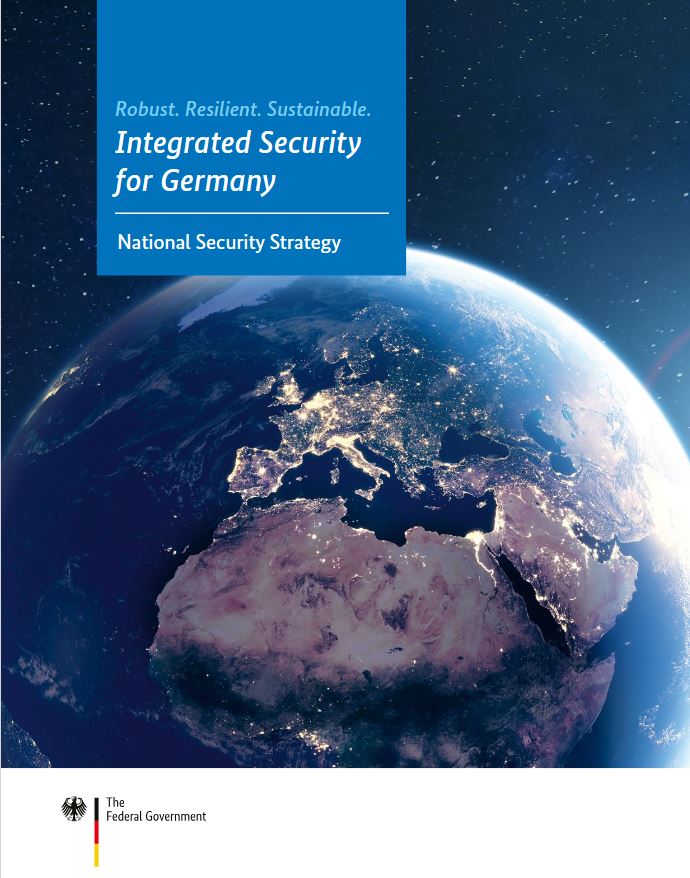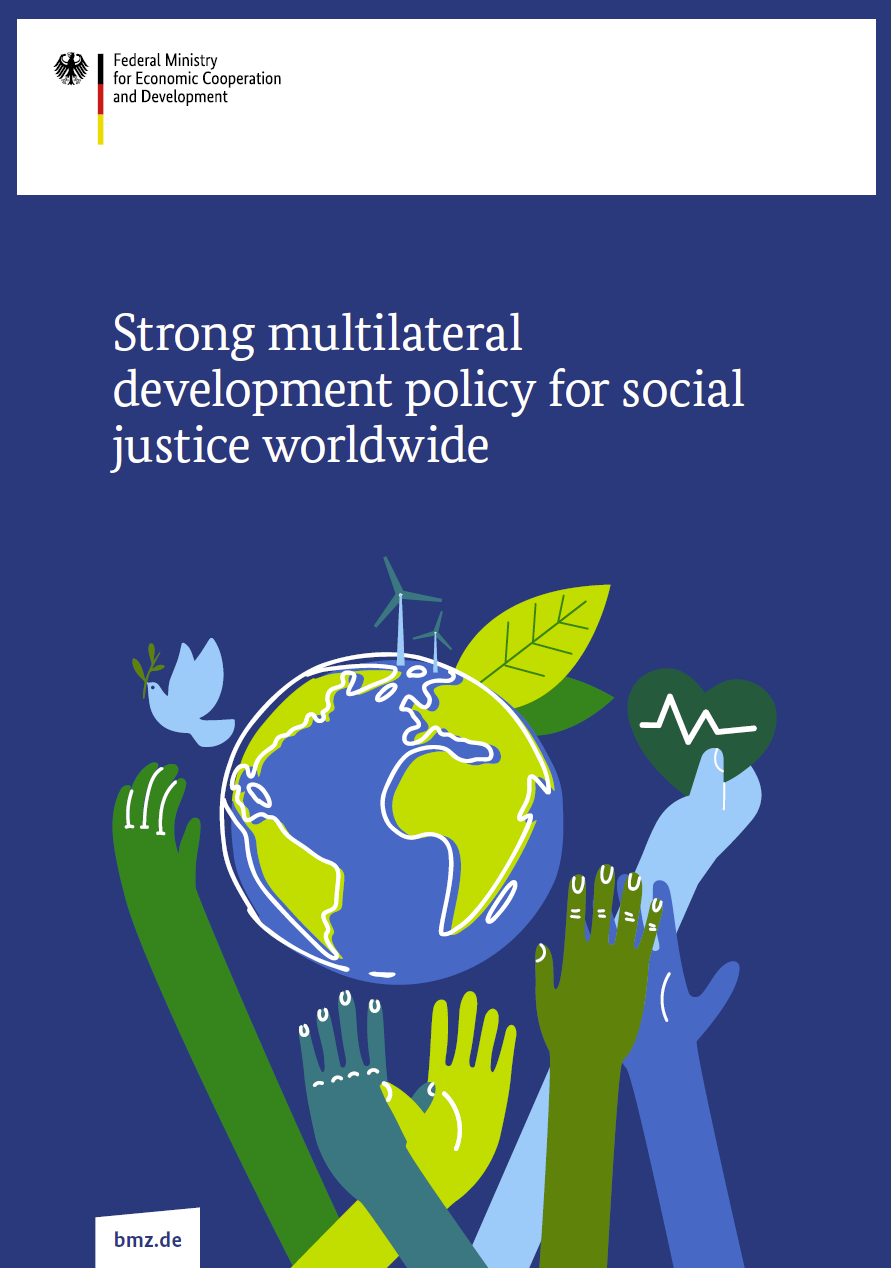Robust. Resilient. Sustainable The German government's National Security Strategy
Global challenges
One in four people worldwide lives in a region affected by crisis and conflict. The security of billions more is threatened by climate change, pandemics, poverty and hunger, autocracies, and international terrorism.
In an interconnected world, these risks and threats do not stop at national borders. So Germany's security is linked in many ways with that of other regions of the world. Germany's development policy addresses these issues and supports efforts worldwide to protect peace and security in developing countries and emerging economies. That, in turn, contributes to peace and security in Europe and Germany.
In its National Security Strategy, the German government points out that development policy plays a crucial role in a policy for integrated security. The government is therefore working to fight poverty, hunger and social inequality and to achieve the Sustainable Development Goals of the 2030 Agenda and implement the Paris Agreement. The German government wants to strengthen those partner governments that are committed to upholding the international order based on international law. In countries whose governments are undermining security and the rule of law, cooperation is shifted to the non-governmental and local levels and a greater focus is put on multilateral approaches.
Cooperation and prevention
The BMZ is working with its partner countries to prevent crises, resolve conflicts peacefully and create institutions and conditions that foster peace and stability. This kind of cooperation is in the interest of partner countries and also important for security in Germany.
In the Security Strategy, the government underlines that “human development and security are prerequisites for lasting peace and stability”. The BMZ is working towards a peace that goes beyond the absence of war and violence and also includes social justice, the protection of human rights and the inclusion of all segments of society.
Human security cannot be achieved by military means alone. It also includes being able to live free from poverty and hunger in an intact environment, without discrimination, persecution or displacement. If people are to live together in peace, they need access to education and healthcare and to secure and adequate livelihoods.
Germany's development policy is geared towards prevention. It focuses on improving people's living conditions in crisis- and conflict-affected regions worldwide, and on supporting recovery and reconstruction efforts.
Crisis prevention, civilian conflict management and peacebuilding
Together with a strong German military and effective diplomacy, development cooperation forms one of the vital elements of the German government's engagement on peace and crises. What development cooperation does is address the structural causes and drivers of conflict. The focus is on crisis prevention, human security and political and social participation, and regional stability.
Germany has effective development cooperation tools for civilian conflict management and peacebuilding at the local and national levels. In its development policy it also addresses polycrises and global challenges such as state fragility, extremism, competition over resources, violent conflict, food insecurity and the impact of the climate crisis. Through these activities, development policy makes a significant contribution towards implementing the National Security Strategy and towards realising a policy of integrated security.
Democracy and human rights
Democratic and inclusive societies that protect human rights are more resilient to crisis and better able to deal with conflicts peacefully. The National Security Strategy emphasises the important role played by sustainable security, the rule of law and political participation in fostering social cohesion and public support for democracy.
Social protection systems play an important role here. They reduce inequalities and prevent tensions within society. That is why developing social protection systems plays an important role in Germany's development policy.
Development policy strengthens democratic structures and good governance and keeps autocratic tendencies in check. The BMZ supports its partner countries, among other things, in fighting corruption and fostering freedom of speech and freedom of the press. Germany's development cooperation also strengthens civil society and independent media as key players for pluralistic, democratic societies. This includes targeted support for women and disadvantaged groups so they can enjoy active and equal participation in social and political change.
Development policy and securing the supply of essential materials for Germany
Our National Security Strategy emphasises that Germany's development policy plays an important part in ensuring security of supply in Germany while fostering sustainable development in our partner countries. Our prosperity and the economic opportunities of the countries of the Global South are closely linked with each other – for example through international supply chains.
That is why the German government is actively working to protect human rights and ensure compliance with sustainability standards in global supply and value chains. That includes supplies of strategic raw materials that are important for the German and European economy.
Protecting the climate, biodiversity and the environment
Climate change, biodiversity loss and environmental degradation threaten the sources of our livelihoods and survival – and, thus, our security. In many regions of the world, it is already evident that this human-induced change is exacerbating conflict, for instance when it causes conflicts over food and water or when it leads to displacement and migration.
What is needed is swift, comprehensive responses – such as a dramatic reduction of global greenhouse gas emissions. A global transformation that is environmentally sustainable and socially just – a just transition – also offers huge social and economic opportunities.
The BMZ is doing valuable work on climate change mitigation, environmental protection and biodiversity conservation, and on preventing global health risks. In this field, its Climate and Development Partnerships are a key part of Germany's development policy.
In countries already affected by political instability or severe crisis, climate change acts as an additional driver of conflict and increases the risk of humanitarian disasters. In such settings, the BMZ assists its partner countries in adapting to climate change and ensuring a secure water supply and food security. The BMZ also supports activities in other areas where climate change, peace and security meet, so as to foster resilient societies.
Alliances and networks
Germany's work on realising the goals of the 2030 Agenda for Sustainable Development also contribute towards the goals of the National Security Strategy. Through its development policy, Germany creates effective networks and alliances and strengthens multilateral cooperation.
Today's world is increasingly characterised by rivalries and power politics. In this setting, strong alliances and networks are very important for dealing with global challenges. Development policy builds the trust that is vital, in particular, in relations with countries and societies in the Global South. In this way, Germany's development policy is playing a constructive role in shaping the international order.
As at: 18/06/2025




